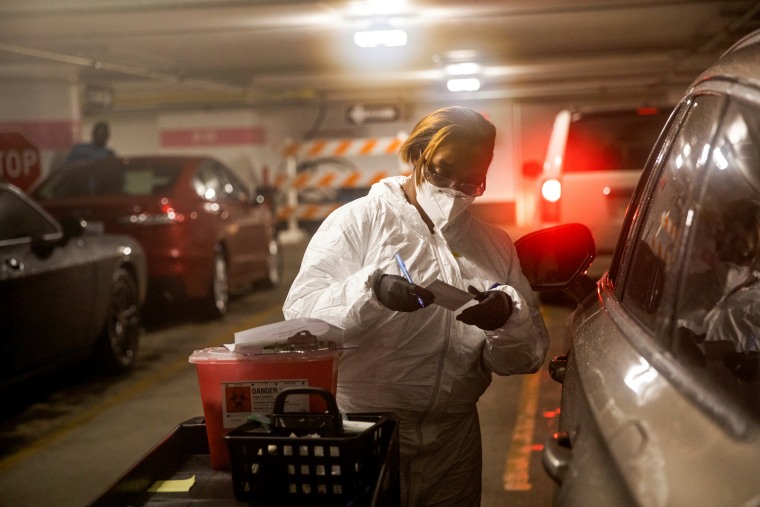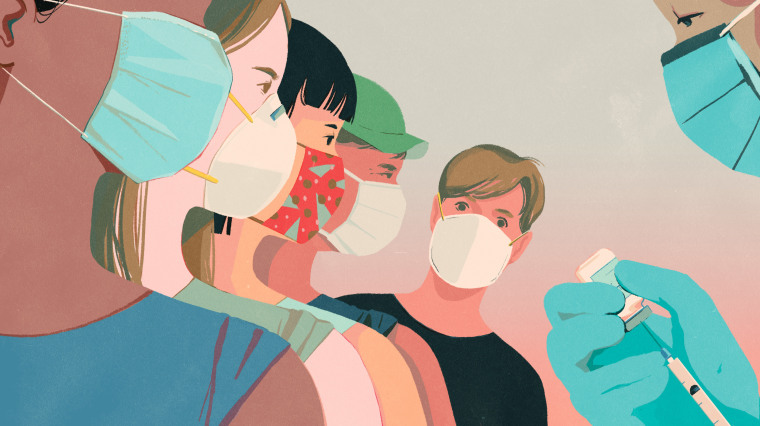DETROIT — While most Covid-19 vaccination clinics around the country are focused primarily on first responders, essential workers and seniors, the city of Detroit is now offering shots to residents who haven’t made vaccination priority lists almost anywhere else in the country.
Among them: Adults with attention deficit hyperactivity disorder, vision or hearing impairments, and other intellectual and developmental disabilities.
“I was surprised to see that and very happy,” said Bonnielin Swenor, an epidemiologist and the director of the Disability Health Research Center at Johns Hopkins University. “It means people in the disability community were listened to, were considered, and prioritization was revised in a way that is really remarkable.”
The city’s move will lead to more equity and access for people with disabilities that Swenor hopes other communities will emulate. “It has the potential to spark a really important change,” she said.
At the same time, the decision to prioritize people with conditions that aren’t necessarily known to increase the risk of dying from Covid-19 points to the difficult and delicate choices facing local and state policymakers in a country where vaccination criteria differ considerably from one community to the next.
In much of the country, two people with the same job, who are the same age and are in similar health, could face radically different odds of accessing the shots depending on where they live, where they get medical treatment and the political landscape in their state.
And within communities like Detroit, where people in their 20s with ADHD can now get vaccinated ahead of people in their 50s with chronic heart or lung conditions, it can lead to difficult questions about whose health should come first.
“These are the judgments that we are making every step of the way,” Detroit Mayor Mike Duggan said during a news conference Wednesday as he announced that Detroiters 60 and older with serious physical health conditions could get vaccinated.
Full coverage of the coronavirus outbreak
Some of the disabilities the city added earlier have been linked to higher risks of dying from Covid-19. Others, such as autism and ADHD, make it difficult to socially distance and wear a mask.
“When everybody in a particular category has had a chance to get a vaccine, we go to the next category,” Duggan said of a city effort to vaccinate 15,000 people a week using an eligibility list that now includes teachers, waiters, grocery clerks, clergy members, postal workers and the homeless. “We went to what we believe to be the next highest risk category.”

‘Overwhelming’ need
The push to prioritize people with intellectual and developmental disabilities in Detroit came from advocates who flooded the mayor’s office with letters and blitzed local media to call attention to the extra challenges people with disabilities face as they try to avoid infection or get treated for Covid-19.
“People with disabilities are being left out of Covid vaccine rollouts and being left out of data collection when somebody contracts Covid, and that leads to disparities,” said Dessa Cosma, the executive director of Detroit Disability Power, a social justice organization that led the letter-writing campaign.
When Cosma heard that Duggan planned to announce, on Feb. 11, that adults with intellectual or developmental disabilities, along with their caregivers, would be added to the city’s vaccination list, she thought perhaps the mayor would narrow eligibility to people with conditions such as Down syndrome and cerebral palsy. Those disorders have been more conclusively linked to higher Covid-19 rates or deaths.
Instead, she was thrilled — and proud — to see that Duggan went broad, including all intellectual and developmental disabilities and specifically naming six conditions, in addition to Down syndrome and cerebral palsy. Among them were autism, Tourette syndrome, hearing and vision impairment, and ADHD, a neurological condition that affects nearly 5 percent of U.S. adults, causing impulsivity, hyperactivity and difficulty focusing.

Since everyone’s condition is unique, Cosma said, a broad definition is crucial to prevent “some very marginalized people from falling through the cracks.”
That broad definition sets Detroit apart.
Many states have adopted the Centers for Disease Control and Prevention’s guidelines recommending that people with Down syndrome be prioritized, and others have prioritized people with developmental and intellectual disabilities who live in group homes. But just a handful of states, including New York, Delaware, Missouri and New Mexico, list people with disabilities among those eligible for a vaccination before the general public.
Among those states, none explicitly include ADHD or visual and hearing impairments among qualifying conditions, though people can make a case with a doctor’s note if they believe they should be eligible.
Even Michigan doesn’t include intellectual or developmental disabilities other than Down syndrome among its vaccination priorities. Detroit was able to include disabled residents because local communities “have the option to prioritize the groups within the guidance they feel are most at risk and at highest need of vaccination,” Lynn Sutfin, a spokeswoman for the state health department, said in an email.
When Duggan made the disability announcement last week, he touted the “overwhelming” need to reach people with conditions that make them more vulnerable to the virus. A spokesman said the city drew its list of diagnoses from the CDC’s definitions of developmental and intellectual disabilities.
‘Trying to get in the line’
Advocates for people with disabilities who have been pushing for vaccine priority across the country applauded Detroit’s decision, especially given the many ways that residents here are struggling.
In a city where nearly 90 percent of residents are Black or Latino and where 35 percent live in poverty, people with disabilities face multiple layers of discrimination and barriers to health care that put them at higher risk for Covid-19, said Justice Shorter, the disaster protection adviser for the National Disability Rights Network.
Detroit has been hit hard by the pandemic, tallying more than 1,800 deaths, including Wayne County Sheriff Benny Napoleon, state Rep. Isaac Robinson and a long list of community leaders.
Some of the disabilities on the city’s list might seem surprising to people not living with those conditions, Shorter, who is blind, said.
“In medical terms, blindness itself might not be considered something that would put you at a heightened risk for Covid,” she said, unless you consider that people with visual impairments rely on others to drive them around or point out hazards, and can’t see whether someone offering to help is wearing a mask.
“You have to consider the ways in which you maneuver through society,” she said.
As for ADHD, advocates note that people with the disorder might not realize they’re too close to others. They might impulsively touch people or things and might get distracted and forget to wash their hands or wear a mask — all behaviors that would put them at higher risk for coronavirus infection.
They also might behave in ways that put off doctors or nurses and affect their ability to get quality health care.
“They may be perceived as difficult to work with, so providers may choose to refer them out or may not be adequately trained to address patients’ needs,” said Emily Hotez, an assistant professor in developmental psychology at the David Geffen School of Medicine at UCLA, who wrote a commentary calling for people with ADHD, autism and other disabilities to get vaccination priority.
While there has been some research on disabilities and Covid-19, advocates say more is needed. They note that disabilities are often left out of statistics that tally virus or death rates by age, race and location.
Not much is known about how ADHD in particular affects Covid-19 outcomes beyond a study last year that found that people with the disorder are more likely to contract the virus, Hotez said. Another study found that people with ADHD who contract the virus are less likely to die from it than others.
Download the NBC News app for full coverage and alerts about the coronavirus outbreak
Some people with ADHD say they do not consider themselves developmentally disabled and questioned whether their condition should get priority.
“I would make sure that other people who could benefit from it more would get it first,” said David Penalver, 20, an aerospace engineering student at North Carolina State University who was diagnosed with ADHD last year.
But when told that a reason advocates believe people with ADHD should get priority is because of behaviors associated with higher coronavirus infections, Penalver reconsidered.
“That’s a good point,” he said. “I happen to have my hands on my face right now. I didn’t even think about that but, certainly, I’m touching handrails and surfaces going up and down stairs. I have a tendency to fidget. I touch my face. I bite my nails.”
Penalver isn’t alone in not immediately considering the ways that neurological and physical differences put people at risk, both during a pandemic and at other times, said Swenor, the epidemiologist from Johns Hopkins University.
“I hope more of that starts to happen even beyond Covid,” she said.
Cosma, from Detroit Disability Power, said her organization has turned its attention to getting intellectual and developmental disabilities added to vaccination priority lists in the rest of Michigan. She is also in contact with advocates who are making similar demands in other states.
“We’re trying to get in the line,” said Cosma, who has a developmental disability and uses a wheelchair, and who was vaccinated this week. “We’re not trying to cut the line.”
